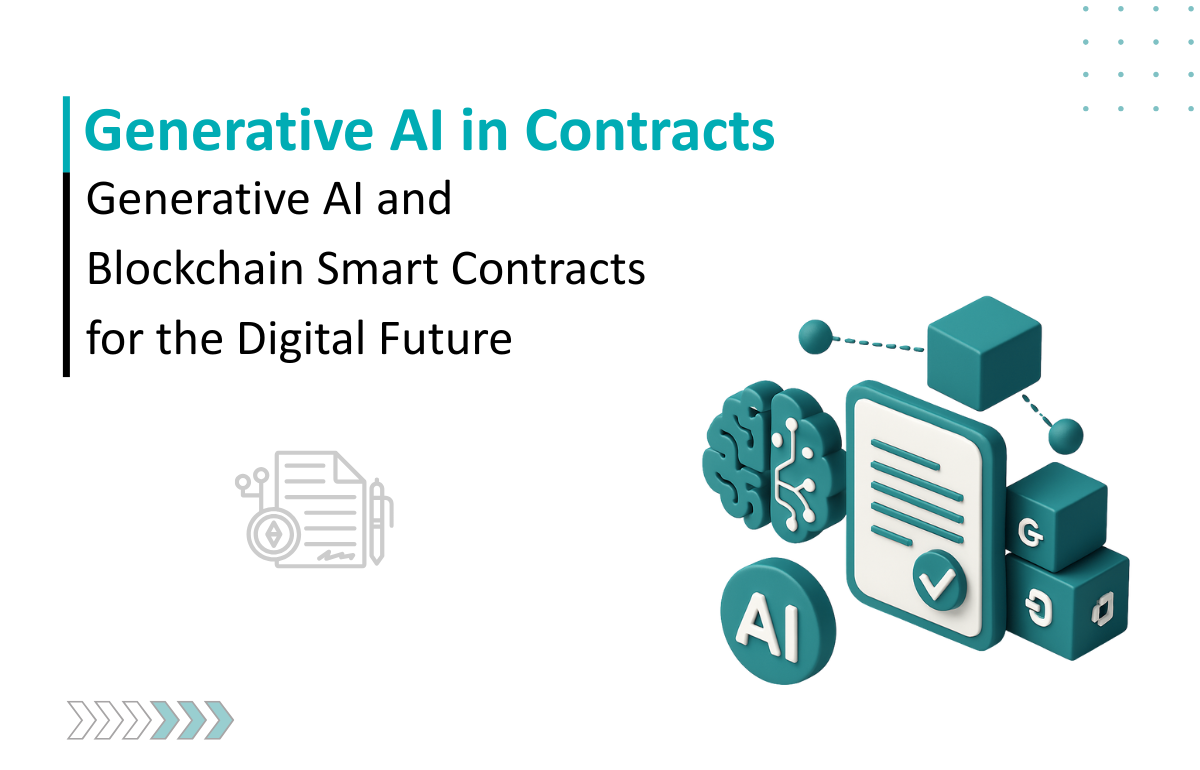
In the past decade, both blockchain and AI have progressed significantly, but in substantially different fashions: blockchain has progressed through trust, transparency, and decentralization, while AI has progressed through levels of automation, intelligence, and personalization that have never been achieved. But the real fun and excitement arise when these two transformative technologies work together. The combination is more than just two different, yet additive, conversations; the convergence produces a dimension of possibilities that seems almost endless. One of the most transformative outputs of this combination is the concept of smart contracts when encased in generative AI contracts that can create, modify, and optimize autonomously, and even create themselves.
In this blog, we will consider this amazing tipping point where generative AI and blockchain meets. We will define AI smart contracts powered by generative AI, describe how they work, consider why they are so mind-blowing, and discuss where we are already seeing them in the real world.
Smart contracts are essentially agreements that run autonomously on their own. Instead of needing a lawyer, broker, or middleman to facilitate a deal, smart contracts can be programmed to follow rules and conditions automatically when certain conditions are met. Smart contracts live on blockchain networks such as Ethereum, Solana, and Hyperledger, creating a secure, transparent, and tamper-proof manner of producing contracts. The difference between smart contracts and contracts is that they eliminate middlemen, reducing costs and risks. Smart contracts make the process viable and run exactly as agreed.
For example:
This same principle has transformed decentralized finance (DeFi), where lending, borrowing, and trading agreements operate without banks or intermediaries, powered entirely by smart contracts and AI, blockchain, and machine learning innovation.
For businesses looking to build secure and reliable contracts, our guide on Smart Contract Best Practices and Secure Web3 Solutions provides expert tips and strategies for creating tamper-proof and efficient blockchain contracts.
Generative AI, including use cases for GPT-4, DALL·E, or other large language models (LLMs), can create new text, code, images, or contracts. The prospect of using generative AI and blockchain technology is even more exciting. Generative AI can write, edit, and improve smart contracts, which can lead to more adjustable, intelligent, and sophisticated smart contracts than ever before.
The combination of blockchain and AI bridges two critical gaps:
1. Decentralized Finance (DeFi)
Generative AI can automate yield farming, lending agreements, and liquidity management contracts that adjust strategies dynamically based on market conditions. These AI smart contracts reduce risks while optimizing performance through smart contract optimization strategies.
AI contracts will monitor IoT data (temperature, delivery time, geolocation), able to enforce penalties or automatically construct and file insurance claims, powered by generative AI and blockchain synergy. The use of smart contracts for supply chain ensures greater transparency, reduces fraud, and automates compliance across different stakeholders, making global logistics more efficient and trustworthy.
3. Healthcare & Insurance
Contracts can generate policies personalized for patients and automatically process claims by analyzing health records and IoT device data.
4. Real Estate
The selling and leasing of properties may use smart contracts from AI, and the smart contracts will automate any updates to clauses in that contract that might reflect changes in taxes, changes in laws, or kind of changes in currency values.
5. Gaming & NFTs
Generative AI can provide rules for unique NFT asset ownership, or it can assist you with developing in-game assets that will actually change as a result of the player's actions.
6. LegalTech
AI can draft binding legal agreements in natural language, automatically translating them into blockchain-enforceable code, reducing reliance on lawyers.
While promising, the fusion of AI and blockchain comes with challenges:
The next decade may see:
Blockchain and generative AI are in a state of revolutionizing the future of digital agreements. Smart contracts and AI are evolving from static, rules-based code to intelligent, adaptable systems that can write, execute, and self-improve while executing. Because of this, we will change possibilities for virtually every industry imaginable, whether automating financial services, gaining efficiencies in supply chains, revolutionizing healthcare, or rethinking digital ownership in gaming and NFTs.
All of this occurs despite challenges of security, governance, or regulatory compliance. The importance of inspiration cannot be understated, as AI-driven smart contracts are just beginning. They will create the ability to have an agreement that can improve and be aware of its context, rather than just being enforced, and be open to everyone. Organizations that get moving now will have advantages that will last for decades in efficiency, transparency, and innovation.
Unlock the future of smart contracts with generative intelligence. Seaflux, a leading custom software development company, offers expert blockchain development services and AI development services. We provide custom AI solutions and smart contracts development services to help your business automate processes, enhance decentralized finance operations, and secure assets in a secure crypto wallet.
Ready to transform your business? Schedule a meeting with us today and explore how our custom blockchain solutions and AI smart contracts can drive innovation and efficiency.

Marketing Executive